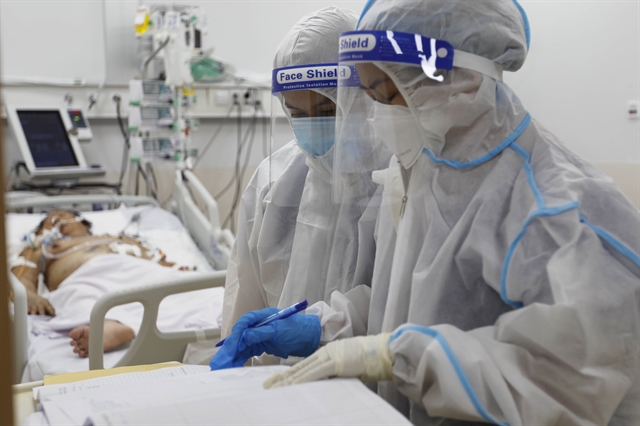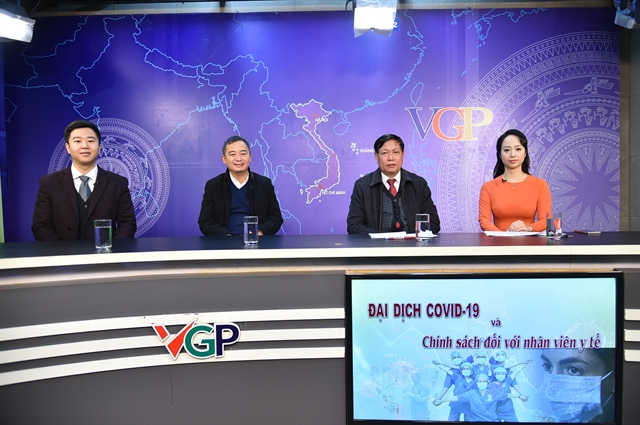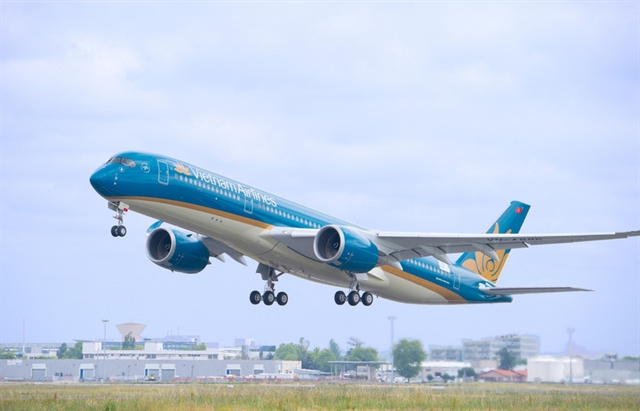 Society
Society

The Ministry of Health plans to reform and renovate the sector’s finance structuring, especially remuneration for medical workers, making it the top priority this year, deputy health minister Đỗ Xuân Tuyên has said.

|
| Healthcare workers at a COVID-19 intensive care unit in HCM City. — VNA/VNS Photo Thanh Vũ |
HÀ NỘI — The Ministry of Health plans to reform and renovate the sector’s finance structuring, especially remuneration for medical workers, making it the top priority this year, deputy health minister Đỗ Xuân Tuyên has said.
Speaking at a seminar on the COVID-19 pandemic and policies for health workers on the Government Portal to celebrate Vietnamese Physicians’ Day (February 27), Tuyên said more specific steps were needed to implement remuneration and allowances for medical staff, especially frontline forces.
This is an urgent job that helps secure and strengthen the contingent of health workers, especially grassroots health workers, in the ongoing fight against the COVID-19 pandemic where they are at the frontline, he said.
He stressed that the ministry would soon finalise the draft document and submit it to the Government for approval.
In reply to data from the Vietnam Young Physicians Association, which showed more than 62 per cent of health workers had not received any payment, Deputy Minister Tuyên said the figure was from a survey between September and November 2021.
The pandemic was complicated, and the country focused on pandemic prevention and control, so the payment was not made on time. All medical staff were ready to do their duty and didn’t ask for allowances.
Once the pandemic was under control, most units and localities paid medical staff.
The Ministry of Health had sent official documents to ministries, sectors, and localities to urgently pay allowances to medical staff.
Tuyên said the Party, the State, the Government, and the Ministry of Health had paid great attention to the policies of health workers and issued many resolutions such as on several specific allowances for COVID-19 prevention and control work.
“The ministry will coordinate with ministries and sectors to review policies and advise the Government about timely policies for medical staff in the fight against the pandemic as a way to compensate them for their sacrifices and loss,” he said.
Tuyên said the Government had assigned the ministry to amend Decree on vocational preferential allowances for public employees in public health facilities.
The allowances will be increased from 40-70 per cent to 100 per cent for employees who have been assigned to work with job titles of health workers and regularly work in preventive medicine and local health centres.

|
| Speakers participate in a seminar on the COVID-19 pandemic and policies for health workers. From left to right: Dr Đỗ Doãn Bách from Bạch Mai Hospital's Cardiology Institute; Dr Nguyễn Lân Hiếu, Director of Hà Nội Medical University Hospital, and Deputy Minister of Health Đỗ Xuân Tuyên Photo dangcongsan.vn |
Bùi Sỹ Lợi, former Vice Chairman of the National Assembly's Social Affairs Committee, said the health sector's policymaking had three major institutional bottlenecks that needed to be resolved to ensure adequate remuneration.
The medical profession has a longer training time than other professions, so designing a different salary table is necessary.
The health sector is in charge of taking care of people's health and saving their lives like the armed forces protect them. Thus, those who work for the health sector should get the allowances like those in the armed forces.
It is necessary to have a special allowance to be applied immediately if a pandemic is declared instead of taking time to resolve.
Lợi said the authorities should amend Resolution 56 to raise and adjust allowances. However, he suggested the allowances could rise by up to 120 or 150 per cent in some jobs.
“It is important to have a special allowance for unprecedented problems when conducting pandemic prevention and control,” he said.
Dr Nguyễn Lân Hiếu, Director of Hà Nội Medical University Hospital, suggested that there should be a guideline on the implementation of Resolution 12/2021/UBTVQH15 dated December 30, 2021, on several policies in the health sector for the prevention and control of COVID-19 pandemic.
“Recently, the telemedicine system has been very effective. Nearly 10,000 cases are being monitored on the portal system of the hospital. However, we all provide a free medical examination as there is no guideline available for the payment,” he said.
Hiếu said there must be a policy to pay medical staff after paying contract salaries and allowances to ensure long-term COVID-19 treatment.
“Finally, by all means, we must have a clear roadmap to turn COVID-19 into a specialist disease with regular medical examination and treatment. It will no longer be a pandemic, and COVID-19 will be like any other disease. Only then will our lives return to normal,” he said.
At the seminar, Deputy Minister Tuyên recalled sacrifices made by frontline doctors and nurses, such as in the cases of Dr Minh Hoàng at Hùng Vương Hospital in Phú Thọ Province who delayed his marriage to fight the pandemic; and Dr Nguyễn Thị Giang and her husband at Kiến An Hospital in Hải Phòng City who sent away their children and volunteered to battle the pandemic; or those who lost their loved ones while on duty at work.
Dr Hiếu said the greatest difficulty for medical staff was not about hardship or overwork, but the feeling of not being able to save a patient's life.
He said the pandemic had moved to a new stage, in which the zero-COVID policy was no longer suitable, and people should now learn how to live safely with the virus.
“Trained medical staff will never give up. We are not afraid of COVID-19. We only fear people panic and lack confidence,” he said. “We hope people will calm down and reduce pressure on medical staff so that we can focus on saving critically-ill patients.” — VNS.




